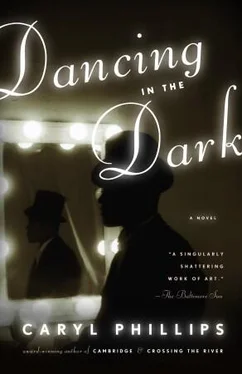Mr. Sam Thompson broke the news to her late one weekday afternoon. Lottie was sitting in the drawing room readying herself to leave for the theater when Mr. Thompson returned home early from work and sat down opposite her. For the longest while he said nothing, and he simply stared at his wife as though unable to release whatever it was that was dammed up inside of himself. And then he spoke quietly, but with a gravity that was meant to assure his wife that everything was under control. But everything was not under control. Florence was dead. The police had found her in a tenement yard behind the city’s most notorious juke joint, with her throat neatly cut and her skirt hoisted up over her shoulders. However, Mr. Thompson spared his wife the more intimate details of her sister’s death and remained loyal to the plain facts of the situation. Florence with her good hair was gone, and the three children were being looked after by the city. Mr. Thompson continued, and he made it clear to his wife that should she wish to take in her three nieces, then he would find it in his heart to tolerate the clamor of growing children in his world. But the single word “tolerate” was like a slap in her face, and Lottie immediately smiled and shook her head. Thank you, but she was sure that the children were being properly cared for, and then the tears began to race down her cheeks. Mr. Thompson leaned forward and eased himself out of the chair. He had to return to work.
She hears her new husband walking slowly up the stairs. His footsteps are heavy so she knows that he has drunk a little more than is good for him, but unlike George, he always stops short of getting tongue-drunk. In the case of her husband, drink simply causes him to stumble somewhat, and melancholy to descend. He pushes the key into the door and eases it open before pausing, as though worried that he might be rousing her from sleep. But she is never asleep, for she likes to wait up and make sure that he returns safely, and so she lies perfectly still with her eyes tightly shut. He closes the door carefully so that it does not whine or shriek, and then he turns the key. He can see in the dark — a skill she imagines he has perfected from years of waiting backstage in the wings — and then she feels the weight of his body on the end of the bed, and she listens to his heavy breathing as he leans forward and removes first one shoe and then the other. She knows the routine. First the socks, and then the shirt, and then he will stand and remove his pants, careful to fold them neatly and drape them over the back of a chair, and soon after he will slide into their bed, but there will be no touching. Her new husband will lie next to her on his back and fall smartly into a deep sleep that will be announced by the thunderous rumbling of his snoring. And Lottie will lie next to him and stare at the ceiling and continue to plan their escape from this hotel and the dull routine that is already threatening to choke the life out of their young marriage.
She looks at two houses, both of which are beyond their pockets, and she wonders if this Mr. Nail insists on showing her such extravagant residences because of the manner in which she is dressed. However, the third house is better suited to Mr. and Mrs. Williams’s needs and their budget. Williams and Walker’s new production, The Policy Players , is doing well, but not well enough for her husband to buy this property without her help and so this will be her gift to him. She looks out of the drawing room window onto the broad expanse of Harlem’s Seventh Avenue— Negro Broadway — and observes finely dressed colored folks promenading up and down the boulevard. This uptown world is changing, and a tall, four-storey house means that if Mr.Williams truly does wish to bring his mother and father out from California, then there will be plenty of room right here. Mr. Nail watches and waits until he imagines that whatever thoughts are running through her mind have finally completed their circuit, and then he steps forward. She already has her hand extended in his direction, and he gently shakes it.
“I can just picture yourself and Mr. Williams in a fine home like this.”
She looks at his beaming face, but having been married to a businessman she understands that punctuating the transaction with such small talk is merely part of the routine.
“Believe me, Mrs. Williams, it is only a matter of time before this whole area boasts the finest-quality colored people.”
He places both of his hands behind his back, pushes himself up and onto the balls of his feet, and then rolls forward.
“You know, I do not care to employ the word ‘fashionable’ because such a word suggests that things may soon change. You are, of course, familiar with the old saying ‘Fashions come and fashions go.’ The word sounds a little insubstantial to me, if you understand what I am saying.”
She does understand what he is saying, but she chooses to say nothing further to this man who seems to care little that he is wasting his time. After all, their business is already concluded. The price is fixed and agreed upon. Why is he still nervously running his untrustworthy mouth in this way? They move deftly down the steep steps and onto the sidewalk. Her mind is made up. She will stroll south as far as 110th Street and the park and then ride a streetcar. Mr. Nail walks six blocks with her and then stops, claiming that he has other clients with whom he is expected to rendezvous. He doffs his hat and politely bids her farewell, and she watches him turn to the left and her eyes follow this man until he is swallowed up by the pedestrian traffic on West 129th Street. Lottie continues south, walking slowly and with as much proprietorial elegance as she can muster, happy in the knowledge that these fine streets will soon constitute her new vicinity.
He takes the news of the house calmly, as though determined to conceal his true feelings from his wife, but these days so much of his behavior falls into this pattern. They seldom exchange more than the occasional sentence, but he eventually looks up at her as though he wishes to say something. She watches his face struggle with the emotions, but finally there is peace and just two words, “thank you.” She asks him if he would like to see the house, or if he would prefer to look at a selection of different properties before signing away their future in this manner, but he simply smiles and tells her that he is grateful that she has taken care of this problem and that he looks forward to the day when they might move out of Marshall’s Hotel and into their own residence. He pauses. “Thank you, Mother.” His voice falls now to a whisper. “Thank you.” Clearly he has said all that he is capable of saying. There is a performance tonight, and she convinces herself that her husband is simply conserving all of his energy for the cakewalking contest at the end of the evening. She rubs and then squeezes the nape of his neck with her gentle fingers. “Would you like me to meet you at the theater after the show?” He smiles again, clearly grateful that she is paying him so much attention, but he shakes his head. “No, Mother. Thank you, but there is no need. I will be fine.”
He falls heavily as he climbs the stairs to their large room at the top of Marshall’s Hotel. She sits bolt upright in bed and then leans over and lights the candle. She can hear him groaning, but she knows instinctively that it would be improper to get out of bed and witness this spectacle, and so she waits until she hears him drag himself up from the stairs and noisily begin to put one foot in front of the other. She fears that it isn’t just the thought of moving and taking possession of a four-storey house that is punishing her new husband like this. In fact, of late, she has begun to wonder if perhaps his parents put the child in him down too early, thus causing him to labor under what appears to be the burden of excessive responsibility. Again she hears him stumble, and this time she rises from the bed and pulls on her gown, but by the time she reaches the door he is already there, bent double, key poised, his pleading eyes looking up at her. Please don’t be angry with me, Mother. There are things going at I cannot talk about. And George does not understand, brimming as he is with a brashness that makes white men angry and causes colored men to move a little closer to him in the hope that some of his confidence might ease its way out of his short dark body and into their own cautious hearts. But me, they look at me and wonder, Mother — they look at me and wonder why I am what I am. All of this with his eyes alone, and she reaches out and takes his hand and key together, and helps his drunken body across the threshold and sits him down on the end of the bed so that the springs squeal and then fall silent again. She leans forward and gently eases off his shoes. Tomorrow, she says, I’ll show you the house. Four storeys looking out on to Seventh Avenue just above 135th, and it has a grand entrance, and once you pass inside you’ll see there’s plenty of room for all of us. He looks at Mother and moves his shoulders first one way and then the other so that she can slip off his shirt. Your folks can come from California. Don’t you think it’s about time they met your wife? She smiles as she says this, and then she runs a heavy hand back through his nice suite of hair. This really is a capital second husband that she has found for herself, a man solid like a tree but with the sensitivity of a boy. His partner, George Walker, was no doubt downstairs in Marshall’s Lounge waiting for whatever clench-waisted, high-yellow dancing girl happened by this evening, but he is Ada’s cross to bear, not hers. She knows that a colored woman cannot expect too much out of this life, but Lottie is satisfied with her young man. She has no complaints.
Читать дальше












